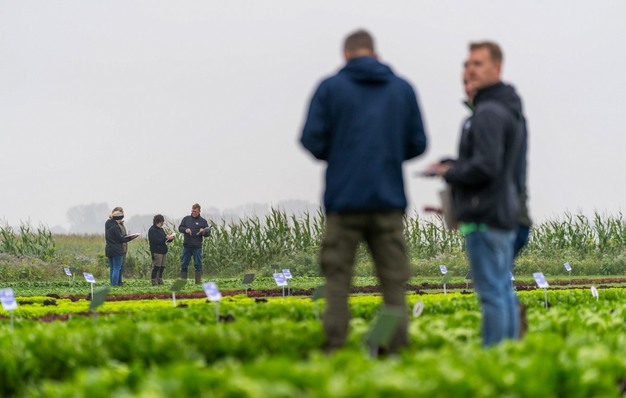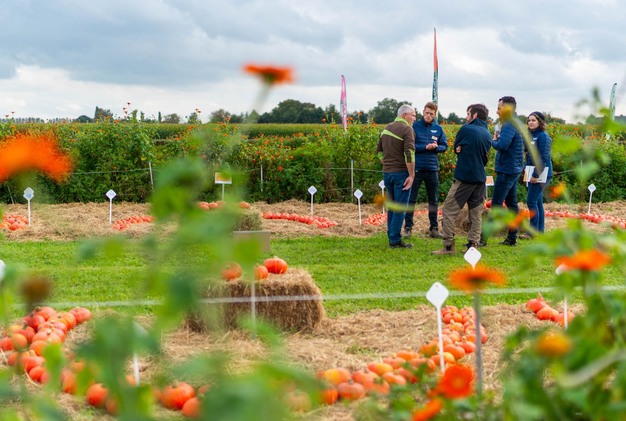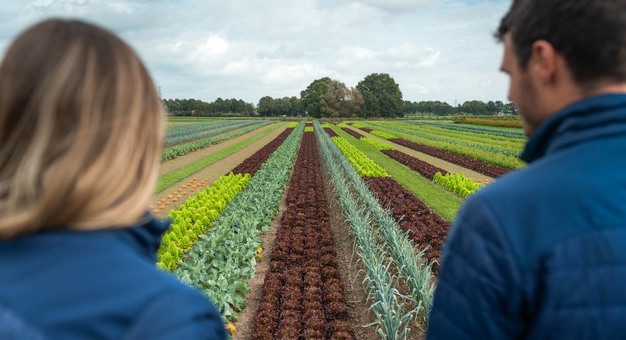Lettuce cultivation is constantly evolving, driven by technological advances and the growing demand for sustainable and efficient farming methods. Traditional outdoor cultivation is facing increasing challenges and innovative new methods like hydroponics are increasingly coming into the picture as an alternative. During the Discovery Field Days in Twisk, Netherlands, Enza Zaden showed their selection of fully Bremia-resistant iceberg lettuce varieties for outdoor cultivation. In the hydroponic greenhouse, visitors could see Enza lettuce varieties that grow rapidly at high density.
Peter Conijn, Senior Breeder Hydrosla at the heads of hydrosla
Resistance plays a crucial role in ensuring successful production when it comes to leafy crops. On the one hand, resistances offer a great advantage for growers in terms of yield and cultivation risks. For partners in the fresh produce chain, resistances mean high-quality products with a longer shelf life. At the same time, resistances guarantee the end user healthier products and chemical-free vegetables, avoiding food shortages. At the Discovery Field Days, visitors could view more than 90 fully Bremia-resistant lettuce varieties on the demo fields and join the Bremia Conference, an interactive presentation on the power of resistance breeding in controlling Bremia lactucae (downy mildew). Also in the spinach and leek range, Enza showed reliable varieties with a comprehensive resistance package.
 Bremia-resistant varieties in Twisk
Bremia-resistant varieties in Twisk
In Enkhuizen, near the Enza Zaden head office, visitors could see hydroponic cultivation in the brand-new hydroponic greenhouse. This greenhouse has more than 67 trials this year. Enza showed new varieties suitable for high-density cultivation, with harvest possibilities for loose leaf lettuce (12-15 cm) and leaf lettuce heads.
Hydro lettuce is grown on floating mats, and the process of sowing and harvesting is fully automated
Hydroponic cultivation is a way of growing crops on water instead of in the open field and interest in this new way of growing is increasing. The USA is leading the way and this way of growing is also on the rise in Scandinavian and Arab countries. Because of energy prices there, hydroponic cultivation can soon be made profitable.
But beyond energy costs, hydroponic cultivation has very many advantages, especially for buyers. Peter Conijn, Senior Breeder Hydro lettuce: "The continuous supply of the same quality is of great value to buyers. Last spring, for example, there was no spinach in supermarkets because of rain, a problem that could have been avoided with hydroponic cultivation. "
Efficient cultivation of lettuce mixes. On the left, the spicy flavor brassica rapa that can be mixed immediately after harvest with the colored and multiform leafy lettuce varieties that have already been mixed during sowing.
Hydro greenhouses are equipped with innovative systems, including automatic sowing and harvesting techniques. No human hand is involved in hydroponics, which not only increases efficiency but also extends the shelf life of the produce. According to Peter, crops from the greenhouse stay fresh for up to 11 days, with minimal leaf oxidation because leaves are harvested automatically and do not need to be washed. "In the full moist soil, fungi quickly develop on the leaves, which you have to fight. The clean hydroponic environment minimizes the risk of diseases and pests, eliminating the need for pesticides. In the USA, it even falls under organic cultivation."
The red color runs deep into the vein
What stands out is the wide variety of products grown with hydroponics. For example, Enza Zaden offers several varieties of lettuce with different leaf colors and shapes, both in heads and loose leaves. Hard work is being done to develop lettuce leaves with the mature taste of a head. In the US, loose, crispy leaves are especially sought after, while in Europe, heads of lettuce, such as trio lettuce, are popular, Peter says.
New facility mimicking field conditions to be officially opened in November
Enza is investing heavily in hydroponics, with a new facility under construction that mimics field conditions. This move will allow them to develop even better on demand and the high demands of the market. According to Enza Zaden, hydroponic has a future and not just a cost-benefit picture. "This approach is not only scalable but also very planable in terms of cost and yield. Hydroponic cultivation makes it possible to make good arrangements for year-round production. In addition, hydroponically grown lettuce can be offered very environmentally friendly hygienically and of a very high quality year-round," Peter explains the advantages.
Easy leaf, head lettuce with deeply cut leaves provides many loose leaves with small cutting surface
These easy leafs were harvested 11 days ago and show hardly any oxidation
New organic varieties at Vitalis in Voorst
The organic lettuce range features recently introduced iceberg grasses with full Bremia resistance and more color has been added to the range with the arrival of a new red oak leaf lettuce and a red cabbage lettuce.
 Pumpkin field in Voorst
Pumpkin field in Voorst
During the Discovery Field Days at sister company Vitalis in Voorst on the demo field - in addition to the entire organic outdoor assortment - also the strip crop. This is a 6-year research project in cooperation with Wageningen University where plant interactions in the strip cultivation system are pollised.
 Strip cultivation in Voorst
Strip cultivation in Voorst
During the Discovery Field Days, Vitalis Organic Seeds also celebrated its 30th anniversary. Vitalis Organic Seeds was founded in 1994, born out of the vision to shape an organic future together with chain parties. In 1998, Vitalis and Enza Zaden joined forces and today Vitalis is part of the Enza Zaden family. At the center of expertise in Voorst, the milestones of the past 30 years were on display.
For more information:  Enza Zaden
Enza Zaden
+31 (0)228 350100
[email protected]
www.enzazaden.com
